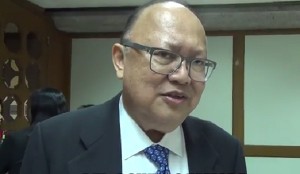The period of residency of Senator Grace Poe cannot be established by her physical presence alone, a congressman and a bar topnotcher said Wednesday.
In a press conference, Minority Leader and San Juan Representative Ronaldo Zamora said the residency is also gauged by the person’s intention to return.
He was reacting to Navotas Representative Toby Tiangco’s claims that Poe does not meet the 10-year residency period requirement for President and Vice President according to her certificate of candidacy (COC) she filed when she ran for senator in 2013. Poe was then the surprise top one senatorial runner.
READ: Grace Poe not eligible for presidency, says UNA
Poe wrote in her COC that she has lived in the Philippines for six years and six months. She will have resided in the Philippines for nine years and six months by May 2016.
But Zamora said Supreme Court jurisprudence already said the period of residency is not as simple a matter as physical presence. Zamora was a bar topnotcher with a grade of 87.3 when he took the exams in 1970.
He was a candidate for Chief Justice in 2012 but it was given to Maria Lourdes Sereno. Zamora also served as executive secretary to former President Joseph Estrada.
“Residency is not established by physical presence. You don’t lose it simply because you go to the United States… I have seen a decision by Supreme Court that involved 30 years in the US. You don’t lose it simply because you adopted another citizenship or you adopted dual citizenship,” Zamora said.
He said residency must also be gauged based on the person’s intent to return, or the doctrine “animus revertendi” (Latin for “with the intention to return”).
“Are these similar to Grace Poe’s case, yes I think so.. The rule is, it is the intention that decides cases like these. ‘Yung sinasabi nilang animus revertendi, the intention to return to the Philippines, and live in the Philippines, and possibly die in the Philippines,” Zamora said.
“In short, the permanency that you should consider is the permanency not of physical presence but of permanency of the intention,” he added.
In a Supreme Court decision Antonio Co vs. Electoral Tribunal of the House of Representatives and Jose Ong Jr., the high court said residency has the same meaning as domicile, which “denotes a fixed permanent residence to which when absent for business or pleasure, one intends to return.”
“The absence of a person from said permanent residence, no matter how long, notwithstanding, it continues to be the domicile of that person. In other words, domicile is characterized by animus revertendi,” the high court ruled in the 1991 decision.
For his part, Tiangco in a separate press conference said Poe’s residency may actually be shorter if the intention to return principle is to be applied.
Tiangco said to his knowledge, Poe only announced her intention to return when she renounced her US citizenship in 2010, or when she was appointed chief of the Movie and Television Review Classification Board (MTRCB). She stepped down when she ran as an independent guest candidate of the Liberal Party alliance for the 2013 polls.
“Ang ibig sabihin, animus reverendi can only apply mag-mula nung ni-renounce niya ang American citizenship… Pagkaalam ko, nung 2010 lang siya nag-apply ng renunciation of American citizenship… Lalong iiksi yung kanyang residency kasi ang alam ko, nagrenounce siya nung siya ay ma-appoint sa MTRCB,” Tiangco said.
Poe’s residency period is the latest of questions raised against Poe’s qualifications to run as president or vice president in 2016, following her popularity in the pre-election opinion poll. Her citizenship issue had also been raised, though Poe has said she has given up her American citizenship and she is now a Filipino citizen.
Poe became a target of criticisms after she fared high in presidential and vice presidential election polls.
In the latest Social Weather Stations (SWS) presidential survey, Poe saw her ranking improved from 21 percent to 31 percent, just five percentage points shy from Vice President Binay (36 percent from 37 percent) who remained in the lead. Liberal Party’s presumptive bet Interior Secretary Mar Roxas got a measly 15 percent of respondents, down from 19 percent.
In the latest SWS vice presidential survey, Poe is the top pick with 26 percent of respondents, surpassing Roxas with 12 percent and Binay with seven percent. TVJ
